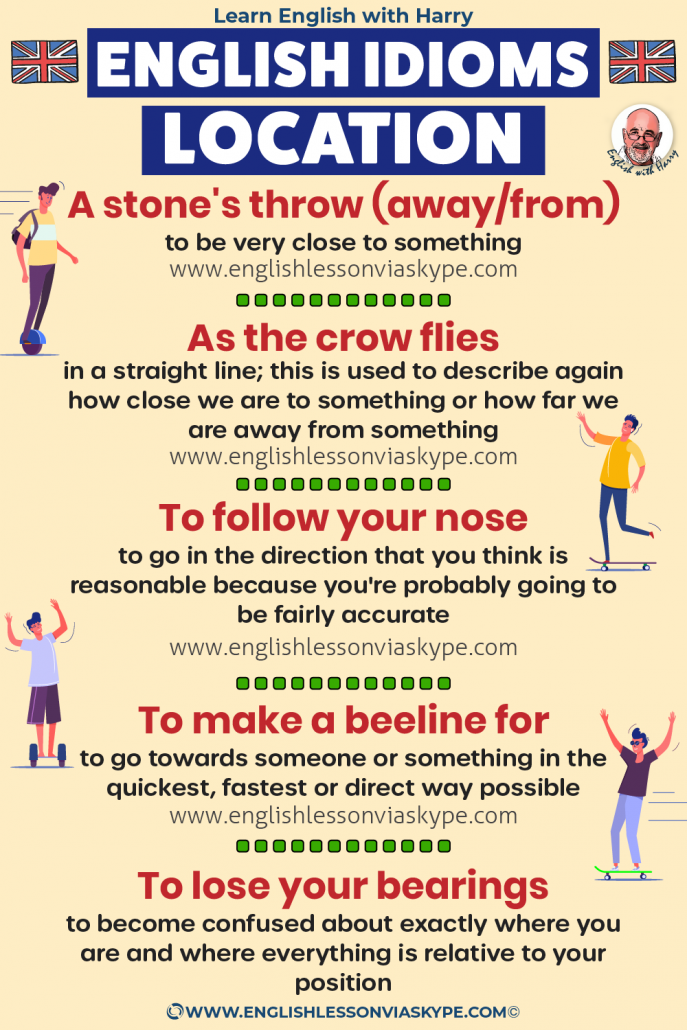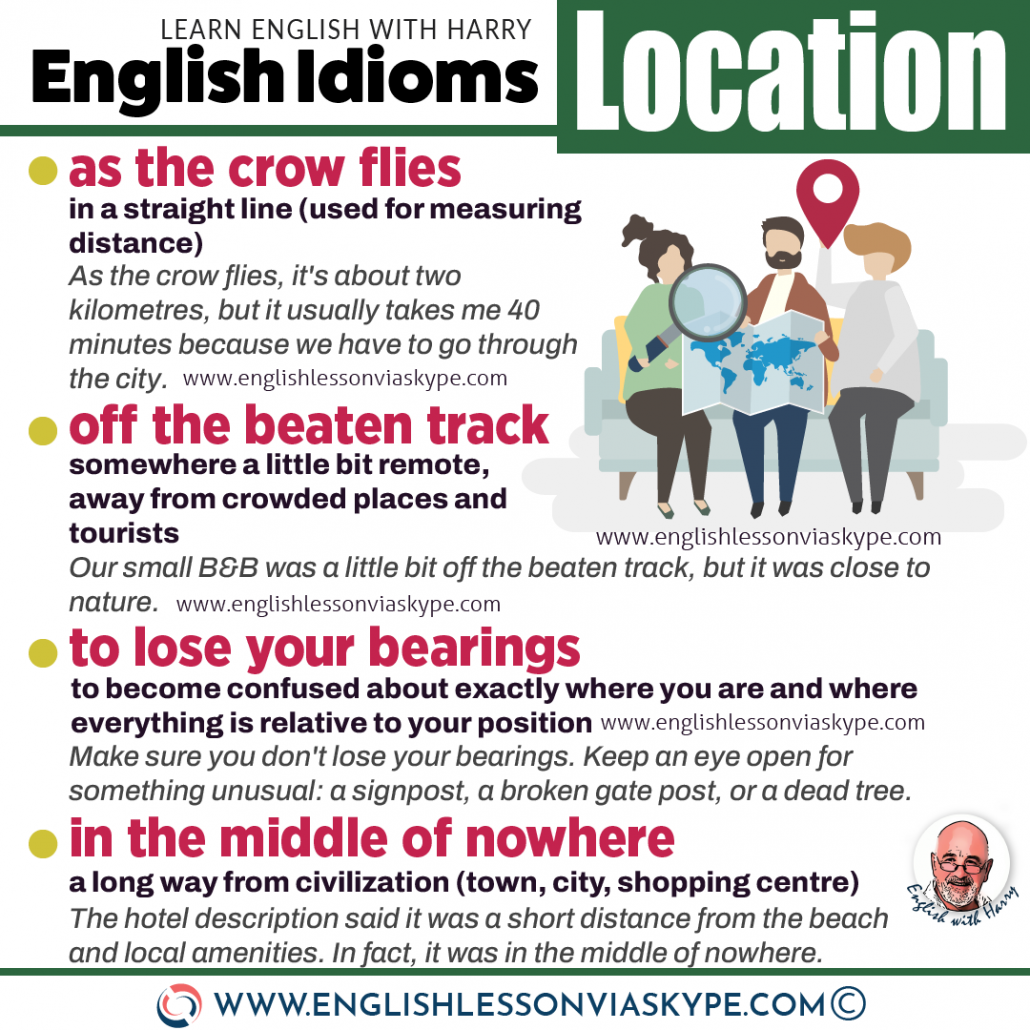Here you will learn English idioms about movement and location.
Listen to the podcast episode on Spotify. Speak Better English podcast is also available to download on other podcast apps.
Table of Contents
Harry
English idioms about movement and location

Hi there, this is Harry and welcome to my English learning Speak Better English where I try to help you to get a better understanding of the English language.
So that you can communicate better with your friends, your family, or your colleagues.
Improve your conversational English, your business English, upgrade your grammar and master your pronunciation.
Today, we’re going to look at some idioms about movement and location. As always, I’ll give you my contact details at the end of the podcast.
So let’s go through them one by one.
Intermediate to Advanced English Marathon

INSANITY: doing the same thing over and over again and expecting different results.
Albert Einstein
- What you'll learn:
- better understanding of more complex grammar structures
- advanced English vocabulary words
- British & American slang
- perfect your listening skills through practing different accents
- This marathon is for you if you're:
- stuck at an intermediate English level
- tired of confusing explanations
- a mature student
- shy & introverted
The first one is
a stone’s throw (away/from)
Meaning: to be very close to something
Examples:
👨 Where’s your new apartment?
👨🦰 Ah, it’s only a stone’s throw from the motorway. You take the first exit, and then you just go down.
It’s a stone’s throw away from the shopping centre which suits my wife because she can go there and shop every day.
Usually, you can’t throw a stone so far; so it does mean generally that something is very close.
as the crow flies
Meaning: in a straight line; this is used to describe again how close we are to something or how far we are away from something
Example:
👱 Where’s the football stadium?
👩🦰 Well, as the crow flies, it’s about two or three kilometres, but it usually takes me 40 minutes because we have to go through the city.
English idioms about movement and location
follow your nose
Meaning: to go in the direction that you think is reasonable because you’re probably going to be fairly accurate; to trust your instincts in a particular situation
Example:
I just followed my nose. I went in the direction that I thought was pretty safe, and I felt that it was going to lead me to the top of the hill. And sure enough, it did!
Literally, when people follow the nose, they usually do it by scent because the nose is how we smell something.
Sniffer dogs follow their nose; they follow a scent to lead them to somebody who is lost or to sniff out contraband tobacco in the airport.
in the middle of nowhere
Meaning: a long way from civilization (town, city, shopping centre, etc)
Examples:
We moved out of town. My wife wanted a garden, and we’ve moved quite a long distance out; we are really in the middle of nowhere.
The hotel description on the internet said it was a short distance from the beach and local amenities. In fact, it was in the middle of nowhere.
You can be lost in the middle of nowhere.
Example:
We took the wrong turn, and we ended up in the middle of nowhere.
book your trial English Lesson
to lose your bearings
Meaning: to become confused about exactly where you are and where everything is relative to your position
Example:
Make sure you don’t lose your bearings. Keep an eye open for something unusual: a signpost, a broken gate post, or a dead tree. So when you retrace your steps later on, you’ll see these, and you’ll know that you’re on the right way back.
You could also lose your bearings if somebody interrupts you when you are reading a document, and they keep you talking for a few minutes. So when you get back to reading the document, you can’t remember where you left off.
You could lose your bearings if you’re a sailor and you’re in the open sea.
to make a beeline for somebody or something
Meaning: to go towards someone or something in the quickest, fastest or direct way possible
Examples:
They made a beeline for the snacks and coffee in the tea area because they hadn’t had lunch.
I was looking around for somebody I know; I saw my friend in the corner and made a beeline for him.
English idioms about movement and location

Share and help other students to improve English language skills.
English idioms about movement and location
off the beaten track
Meaning: somewhere a little bit remote, away from crowded places and tourists
Example:
Our small B&B was a little bit off the beaten track, but it was close to nature. It was very peaceful. You wake up to the sound of birds every morning.
to stop dead in your tracks
Meaning: to stop very suddenly either because you’re surprised or because something happened very quickly
Example:
We stopped dead in our tracks when we heard the sound of a grizzly bear.
English idioms about movement and location
to take a shortcut to something
Meaning: to take a route that is quicker and shorter than usual in the hope to get somewhere quicker
Example:
I normally take this shortcut to get to work, but it actually took me twice as long today due to roadworks.
Generally, there are no shortcuts to success in life.
We can also take a shortcut when we’re reading a document.
If the document is very very lengthy, and we haven’t got the time, energy or inspiration to read the whole lot, we try to find a summary of the document.
to take the scenic route
Meaning: to follow a longer path or route than you had thought because it could be more attractive
Example:
Take the scenic route along the cliff, and you’ll get the most beautiful views.
It can also be used in a sarcastic way:
Did you take the scenic route? We had a meeting set up for 10 o’clock and it’s 10:45 now.
Meaning you’re supposed to be there much sooner, but it’s taken you a long time, and people were getting a little bit annoyed or anxious waiting for you.
- a stone’s throw (away/from)
- as the crow flies
- follow your nose
- in the middle of nowhere
- to lose your bearings
- to make a beeline for somebody or something
- off the beaten track
- to stop dead in your tracks
- to take a shortcut to something
- to take the scenic route
I hope you’ve enjoyed them.
As always, thank you for listening. If you want to contact me, you can do so at www.englishlessonviaskype.com
Very happy to hear from you and very happy to include any of your suggestions.
⚠️If you want online English lessons on a one-to-one basis and you think we can help you, please contact us.
Thanks for listening; join me again soon.
More information
For more information on English grammar rules, English collocations and English idioms, check out the links below:
English idioms related to TECHNOLOGY
22 English verbs related to MOVEMENT
Don’t forget to check out intermediate and advanced English lessons at Learning English with the BBC.
You will love these English lessons

10 Ways To Say I don’t Know
Here you will learn 10 ways to say I don’t know in English. Advanced vocabulary to help you achieve fluency in English. Video lesson. Lots of examples.


Advanced Adjectives To Describe Travel Experiences
English adjectives to describe travel experiences. Advanced English lessons on Zoom and Skype.


Phrasal Verbs related to a Football Match
Here you will learn English phrasal verbs related to a football match. If you are a football fan, this will